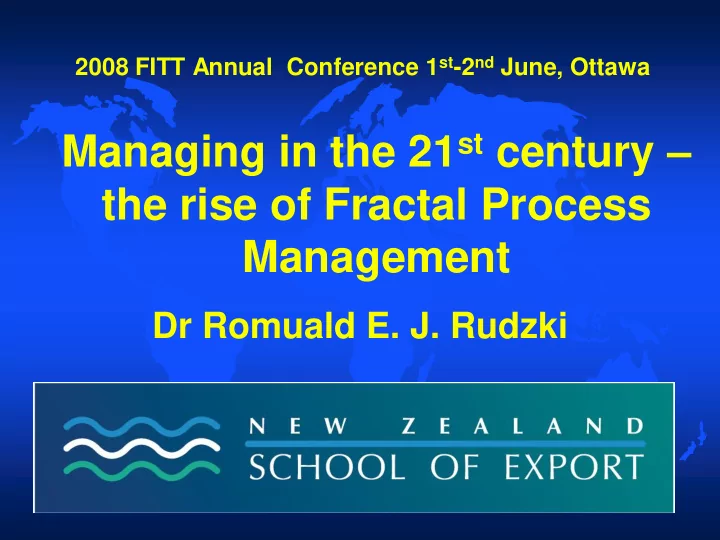

2008 FITT Annual Conference 1 st -2 nd June, Ottawa Managing in the 21 st century – the rise of Fractal Process Management Dr Romuald E. J. Rudzki
Session description “ Join us for a stimulating and entertaining presentation aimed at getting people thinking about what is wrong with modern management, how it prevents progress and how to fix it. This will be a highly interactive session aimed at getting delegates to exchange ideas and work through the FPM process.”
About me Worker (14+) Serial entrepreneur Scholar Artist Ageing (turned 50) Other
About New Zealand “God‟s own country” 4 million people 40 million sheep Interest rates at 10.25% Coalition government Nuclear-free
What is wrong with modern management?
What is management? “Management is about running things well.” (Rudzki, 2005) (Action v. purpose: not what you do but what you do it for)
Therefore ( ergo): “Mis -management is about running things badly or not running things well.”
How does management prevent progress? Q. If your own organization was well-run, how would it be different for: (a) its customers, and (b) its staff? Q. What is preventing this?
What do you want from your job in terms of: Pay Nature of the work itself Colleagues Physical environment Hours and days of work Holidays Pension Other
Fixing modern management One solution: Fractal Process Management
Why ‘fractal’? A fractal is a form of organization occurring in nature which replicates itself at each level of complexity. When applied to organizations, this characteristic ensures that at each level, the needs of the lowest level are repeated (contained) in the purpose of the organization (rather like a Russian Matryoshka doll).
Who defines what ‘well’ means? Currently this is defined by the governing body (Government, Council, Board of Directors etc) or external stakeholders such as shareholders.
How is ‘well’ currently defined? Profitability Return on Investment (ROI) Productivity/efficiency gains Market share Management by Objectives Quality Standards etc.
Beyond modern management Beyond modern management lies an evolution to a system of running things which is not rooted in the industrial management of the 18 th and 19 th centuries where human beings were seen as „muscle power‟ (compared to „human resources‟ today).
A plea for humanity Human beings can no longer be treated as „cogs in the machine‟ – the „objects‟ rather than the „subjects‟ of work (John Paul II). Rather, the machine must serve its human operator and not „do its own thing‟ or be a „legal person‟ with equal or greater rights than a human being.
The Fractal Process Model The Fractal Process Model (FPM): 1. Context (where are we now?) 2. Approach (how best to do this?) 3. Rationale (why are we doing this?) 4. Actions/dimensions/activities (what do we need to do?
5. Monitoring and review (how do we know if we have achieved our purpose?) 6. Adjustment, Reconceptualisation (what do we need to change? What have we learnt? How do we understand things differently?)
1. Context The first stage - Context - allows for locating the purpose of the organisation by asking „what is our purpose? What are we hoping to achieve?‟ (Rather than „what is it we do?‟ which relates to action rather than purpose , where some of the actions can be unnecessary or even counter – productive, such as unnecessary administration).
2. Approach In the second stage – Approach – information is gathered on the best ways to achieve the purpose . This takes into account the needs of customers and staff as the basis of the strategy.
3. Rationale By asking „why are we doing this?‟ – not only is the purpose made plain, but also the reason for the purpose is made explicit, such that the purpose itself can be questioned in the light of the previous stages. This is a form of liberation from history (“ because we’ve always do it this way .”.
4. Actions By identifying the purpose and the reason for it (rationale) in the previous stages, it is then possible to move on to identifying what actions or activities need to be undertaken to achieve the purpose (rather than at present where „the purpose of management is to manage‟).
5. Monitoring and Review In the absence of this stage, it would be difficult to answer the question „Have we achieved our purpose?‟ (This is difficult to answer if you do not define your purpose at the outset).
6. Reconceptualisation This final stage moves beyond review into a virtuous spiral of increased knowledge, by identifying how the process of implementing the model has led to a change in understanding such that the purpose can be redefined and progress can be made.
In conclusion Moving beyond a modern management which is based on power and productivity, to a fractal process based on organisational purpose and the needs of customers and staff, will radically redefine how organisations are run and who for.
“The most successful managers and organisations of the 21 st century will be those who are able to align the disparate needs of their customers and staff with the needs of the organisation.” (Rudzki, 2008)
Thank You! Any questions?
Recommend
More recommend